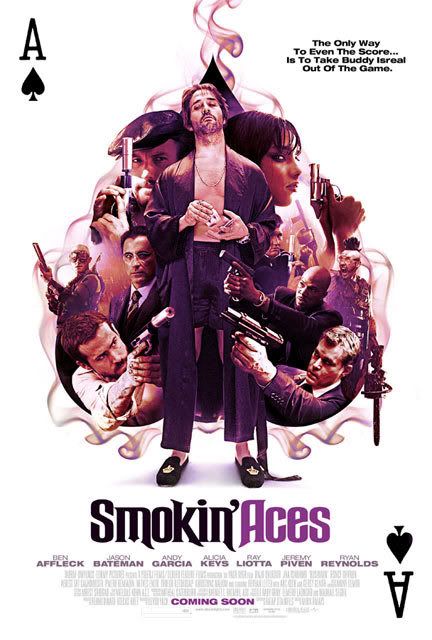 about two thirds of the way through Smokin' Aces, a strange thing happens: two key characters are overcome with emotion at the (perceived) passing of beloved partners. this is not peculiar in drama, of course, nor the real life it strives to emulate, but it is strange in the context of this messy, morally desolate film, which wears a flippant disregard for life on its bloody sleeve. and it's at that moment that Aces finally manages to shake its audience completely loose: how are we supposed to empathize with grief after an hour of little but gratuitous, meaningless violence?
about two thirds of the way through Smokin' Aces, a strange thing happens: two key characters are overcome with emotion at the (perceived) passing of beloved partners. this is not peculiar in drama, of course, nor the real life it strives to emulate, but it is strange in the context of this messy, morally desolate film, which wears a flippant disregard for life on its bloody sleeve. and it's at that moment that Aces finally manages to shake its audience completely loose: how are we supposed to empathize with grief after an hour of little but gratuitous, meaningless violence?scads of other movies are vulnerable to the same criticism, of course. and i'm still not sure what makes Smokin' Aces stand out in the crowd. but somehow it pushes into focus a truism in the discussion of violence's role in entertainment: violence is a natural, thrilling manifestation of drama, and as such it's a useful narrative tool, especially in a medium as visceral as film. here, though, there is no drama...only violence. sure, Carnahan wraps the carnage up in a pretty package consisting of a terrific premise (soured by embarrassingly expository bookends) and an creative cast suggesting a cut-rate splatterhouse Grand Hotel. but the real star is tried-and-true ultraviolence, stylishly and emptily employed at every turn. and though this sort of mayhem at its most delirious can be extremely fun in the right hands, precious few of the scenes find the necessary tone, and as a result the audience has little to do but think about whether or not they're psychologically comfortable with the fact that so much violence could be so goddamned boring.




No comments:
Post a Comment